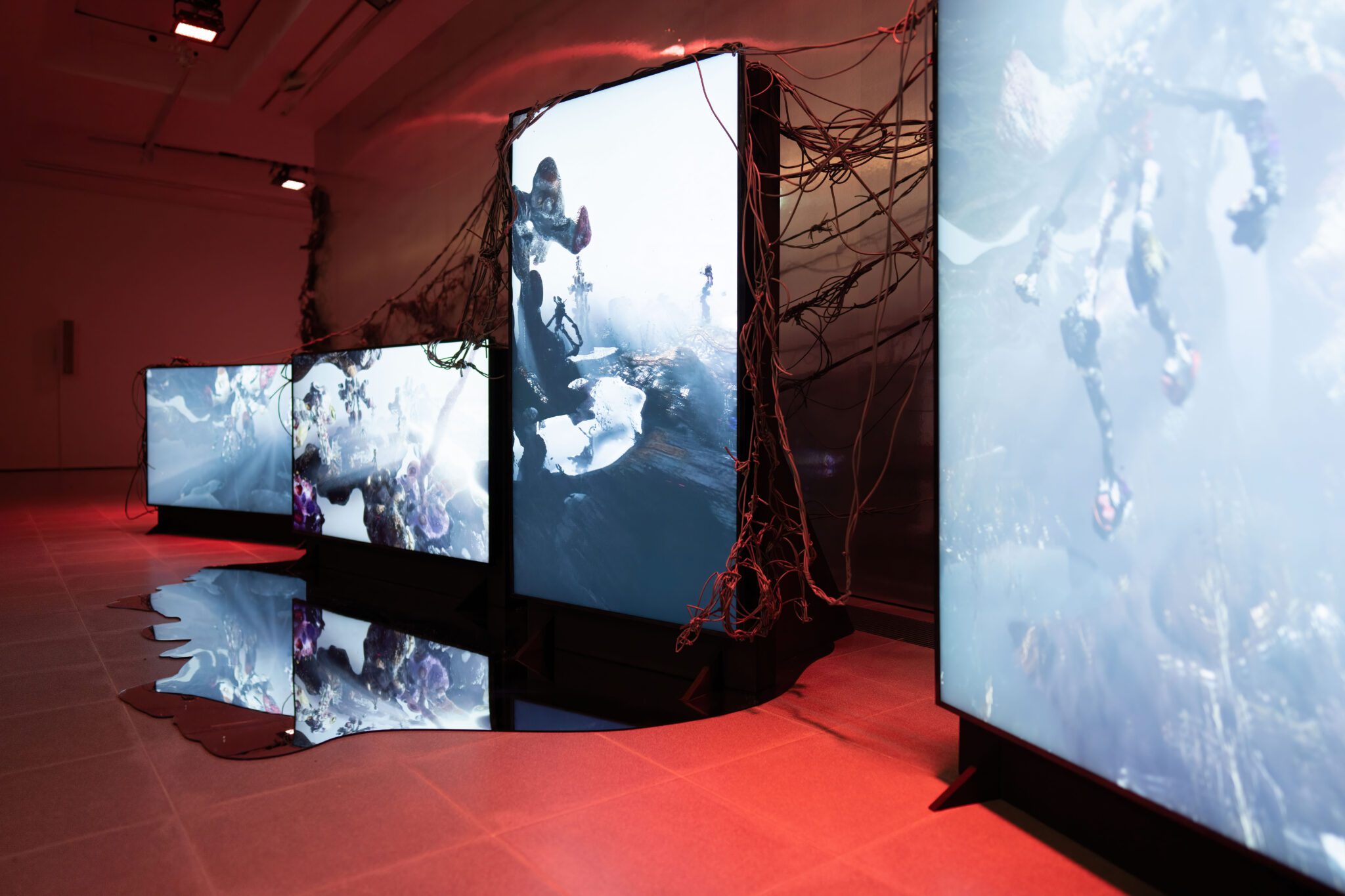Alongside various collaborators at the Serpentine Gallery, London, Massan asks what we want the ‘developing world’ to develop into anyway
The phrase ‘third world’, once used by Westerners to describe the world beyond Europe and North America, has long been dismissed as pejorative, reflecting nothing more than the assumed superiority of the ‘first’ and ‘second’ worlds. Subsequent terms – the ‘developing world’ and, more recently, the ‘Global South’ – have replaced it. Lying between those two more recent terms, though, is a tension that fringes the worldview of Gabriel Massan’s exhibition: that to talk of less industrialised countries as ‘developing’ insinuates that industrial society – in an age of heightened ecological concerns – is a model worth ‘developing’ towards in the first place.
Third World includes the work of five African-diaspora Brazilian artists alongside Massan, who are also figured as ‘collaborators’ on the artist’s eye-popping, eponymous videogame platform that forms the centrepiece of the show. If you believe the gallery text’s breathless, somewhat overweening assertions, it’s a ‘decolonial game’ exploring ‘Black Brazilian experience as it intersects with the ramifications of colonialism across physical and digital realities’. Installed in the two gloomy central spaces of Serpentine North, players seated in hairy fake-fur gaming chairs get to navigate Massan’s various avatars through surrealistic natural landscapes and biomes, seeking out energy crystals and avoiding bizarre monsters. Massan’s long-limbed creatures are alienlike hominids, bodies the texture and contours of coral or bone, coloured as if decorated in polychrome mosses or fungi and painted in mysterious glyphs.
So: it’s a first-person shooter. With a difference. The player’s journey – starting with directives issues from a squeaky-voiced, vaguely malevolent representative of a corporate-sounding ‘Headquarters’ – begins with a mission to ‘extract’ two mythical objects, which turn out to be intimately linked to the fragile ecological equilibrium of Massan’s virtual world, Igba Tingbo. Lush with swaying plants and shimmering lagoons, populated by sprites and lumbering giant biomorphs, it’s a mesmerising gameworld. Even so, it soon slips into polemical mode, with characters explaining that taking the objects – the ‘bag of infinite seeds’ and the ‘air artifice’ – will destroy this idyllic world. Take them and you suddenly find yourself under attack; leave them be and you get to play further levels. From the initial ‘explorer’ character, one becomes an ‘invader’. Led by glowing arrows from one benignly condescending eco-spirit entity to another, the player is told they need to be ‘cured of their greed’.

For all its hypnotic and at times breathtaking visual imagination, Third World leads its player towards a set of political tropes that link ‘extractivism’ to colonialism, and to the destruction of an otherwise harmonious environment; its inhabitants are connected to all other living things via a collective ‘energy’, and in which the invading player is meant to see the error of their ways. Ultimately it’s little different to such mainstream fare as James Cameron’s Avatar films (2009–), and no less simplistic as a morality tale.
Through its biomorphic aesthetic and reference to the various diaspora traditions of Massan’s collaborators, Third World equates traditional cultural outlooks (by implication precolonial and un-Western) with a more symbiotic, nonindustrialised relationship to the environment. It’s a fashionable cultural currency. But it reduces economic development to little more than pernicious industrial ‘extractivism’. It’s odd, for example, to read the exhibition text conflate Brazil with ‘non-industrialised, developing nations’, as if Brazil was not the tenth biggest economy in the world.
Not that this seems to be much of a concern for Massan’s coexhibitors. Ventura Profana’s photomontage Untitled I I (2020) stages an image of Brazil’s terrible Mariana dam disaster of 2015 under the ‘hands touching’ detail from Michelangelo’s Creation of Adam (1508–12), apparently to remind us of the ‘destructive ideologies’ of ‘human tradition and religion’ (the dam was attached to a mining operation). Other works sit, awkwardly installed, around the gallery’s perimeter circuit: Novíssimo Edgar’s painted cement masks and sewn found textile hangings offer jubilant fusions of Afro-Brazilian religious icons with Brazilian pop culture; Castiel Vitorino Brasileiro’s installation Attitudes of Time I (2023) stands tall logs on imposing rectangles of earth, the white cloths nailed to them purportedly signifying the ‘spiritual world, wisdom and transmutation’. Though as a sculpture viewed in a Western art gallery this last is a rather inert experience.
Aligning indigenous and Black diaspora traditions (and, with the artists in the show, queer identities) in opposition to colonial history makes sense. But putting a question mark over ‘development’ serves no one in the Global South, or anywhere else. In the notes, Massan cites the Brazilian educator Paulo Freire’s important book Pedagogy of the Oppressed (1968) as an influence, and Third World hums with Freire’s understanding of the necessity of opposing ‘cultural invasion’: ‘Cultural conquest leads to the cultural inauthenticity of those who are invaded’, Freire wrote. But then he was also concerned with the authentic, self governed economic development of ‘Third World’ societies. One wonders what he would have thought of Third World’s slanted privileging of traditional identities and ecology over modern societies of the Global South and the prospects for their future.
Third World: The Bottom Dimension at Serpentine North, London, through 22 October
